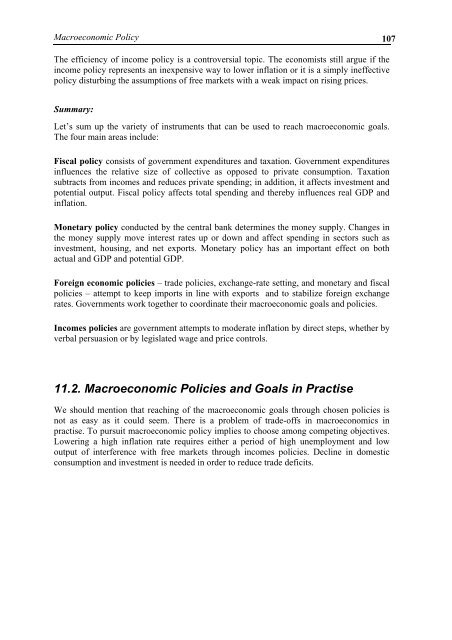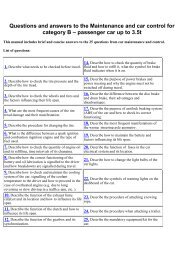MacroeconomicsI_working_version (1)
You also want an ePaper? Increase the reach of your titles
YUMPU automatically turns print PDFs into web optimized ePapers that Google loves.
Macroeconomic Policy 107<br />
The efficiency of income policy is a controversial topic. The economists still argue if the<br />
income policy represents an inexpensive way to lower inflation or it is a simply ineffective<br />
policy disturbing the assumptions of free markets with a weak impact on rising prices.<br />
Summary:<br />
Let’s sum up the variety of instruments that can be used to reach macroeconomic goals.<br />
The four main areas include:<br />
Fiscal policy consists of government expenditures and taxation. Government expenditures<br />
influences the relative size of collective as opposed to private consumption. Taxation<br />
subtracts from incomes and reduces private spending; in addition, it affects investment and<br />
potential output. Fiscal policy affects total spending and thereby influences real GDP and<br />
inflation.<br />
Monetary policy conducted by the central bank determines the money supply. Changes in<br />
the money supply move interest rates up or down and affect spending in sectors such as<br />
investment, housing, and net exports. Monetary policy has an important effect on both<br />
actual and GDP and potential GDP.<br />
Foreign economic policies – trade policies, exchange-rate setting, and monetary and fiscal<br />
policies – attempt to keep imports in line with exports and to stabilize foreign exchange<br />
rates. Governments work together to coordinate their macroeconomic goals and policies.<br />
Incomes policies are government attempts to moderate inflation by direct steps, whether by<br />
verbal persuasion or by legislated wage and price controls.<br />
11.2. Macroeconomic Policies and Goals in Practise<br />
We should mention that reaching of the macroeconomic goals through chosen policies is<br />
not as easy as it could seem. There is a problem of trade-offs in macroeconomics in<br />
practise. To pursuit macroeconomic policy implies to choose among competing objectives.<br />
Lowering a high inflation rate requires either a period of high unemployment and low<br />
output of interference with free markets through incomes policies. Decline in domestic<br />
consumption and investment is needed in order to reduce trade deficits.




